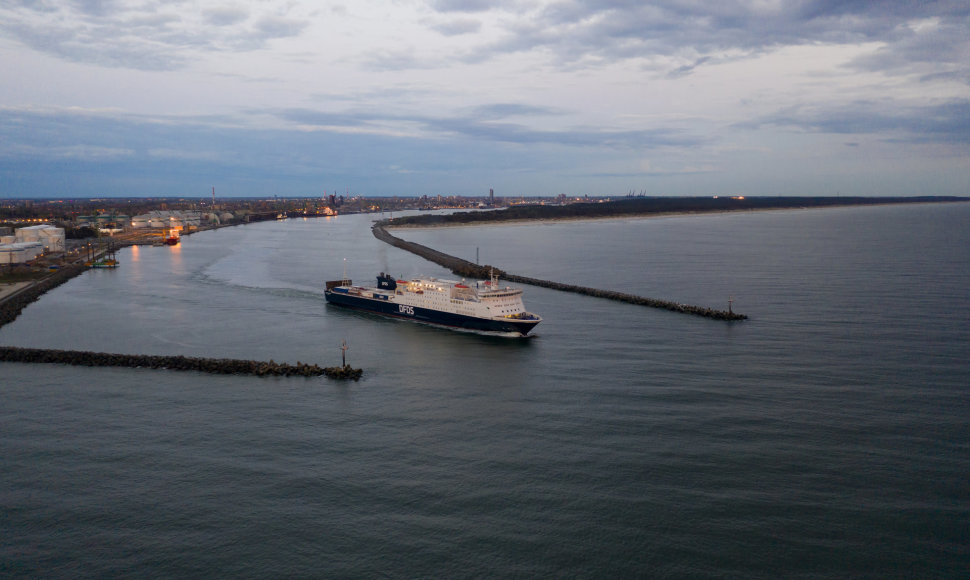The restrictions changed people’s travel plans but offered the opportunity to discover alternative routes and water transport, which proved especially convenient for summer visits to Germany and Scandinavia.
Even during the lockdown, maritime routes remained a reliable and safe connection to the world. When travel restrictions were loosened in the summer, ferries became an important line of transportation to the Northern and Western Europe for holidaymakers. “For some people, we became a window, which opened after the doors of the airplanes had closed,” says Vaidas Klumbys, head of public relations and communications for the Baltic States at DFDS, one of the largest ferry operators in Europe.
Ferries expanded opportunities for travelling by car
The pandemic had a worldwide effect on people movement and passenger flows. DFDS ferries also saw fewer passengers this summer. According to the company’s data, during this summer their ferries from Klaipėda to Karlshamn in Sweden and Kiel in Germany have transported 30% fewer passengers than usual.
“During the pandemic the self-isolation requirements in Lithuania meant that people from Sweden and Denmark limited their travelling to Lithuania, we received considerably fewer German visitors too. On the other hand, some routes saw a marked increase in the number of Lithuanian, Latvian and Estonian passengers. This was influenced by the Baltic States’ travel bubble, comfortable routes to Germany and Scandinavia, certain changes in the competition environment as well as the introduction of ferries with improved passenger services on certain routes. For example, the route from Paldiski (Estonia) to Kapellskär (Sweden) saw our ferries transporting over 60% more passengers than last year. The number of people travelling by car has increased as well,” explains Klumbys.
Thousands of passenger questions answered and a baby delivered on board the ship
During the lockdown, the ferry operator significantly expanded its call centre team in order to help the Lithuanian citizens working abroad as well as the people from other countries to return home safely. “Lithuanians working abroad comprise a sizeable number of our regular customers. In order to obtain the most up to date and reliable information on their journeys, they first contacted us. We helped our clients adjust their travel plans, find the best routes and safely reach their destinations,” the DFDS representative says. According to Klumbys, the summer period was no less intensive at the call centre than spring, when significant changes were being introduced across Europe in response to the pandemic threat.
Most of the inquiries were related to restrictions due to the COVID-19 virus, travel conditions on the ferry and safety assurance procedures. The DFDS team closely followed the information and decisions communicated by the World Health Organisation and the individual countries – all the staff were prepared to answer various questions, not just those related to travelling by ferry. This year the total number of calls has tripled compared to the same period last year and just over the summer 14,224 calls were answered, helping those travelling or planning their journeys to get a more accurate picture of the situation and make appropriate decisions.
And yet, according to Klumbys, the most impressive challenge this year came in late July when on board of Regina Seaways ferry the crew, assisted by a doctor from Germany, helped deliver a baby. This was the first in twenty years of the company operating in Lithuania. A healthy baby girl was born for a Lithuanian couple and the entire family safely reached the shore.
Safety ensured by strict procedures
Klumbys points out that during the summer DFDS began a flexible travel date change policy which will continue during the autumn season too: “We understand our clients’ concern over the uncertainty of the future and so we offer them the opportunity to change their travel date for no extra fees.”
The representative of DFDS emphasises that passenger safety on ferries will continue to be ensured by strict security measures and adherence to requirements. Ships have had the number of passenger spaces reduced, services are also offered differently: in the self-service restaurants operating on the ferries passengers are being served food by crew members, protective face masks are mandatory in shops and common areas. Regular cleaning and disinfection procedures have also been made more frequent and stricter.
Staff working on the DFDS ferries have been trained to assist passengers in maintaining a safe distance, to help them and remind them of mandatory safety requirements and self-isolation rules. The contact centre informs passengers of the need to fill out the e-form by the Lithuanian National Public Health Centre which is mandatory prior to entering the ferry. “We all understand that at least for some time things will be unlike before. Therefore we will aim to make all the safety measures applied during the summer permanent. We are adhering to all the requirements and help our clients do the same,” says Klumbys.
The new procedures, which have been implemented during the summer, will continue to apply during the autumn season. According to Klumbys, there were numerous challenges – the crews had to work under unique conditions and at the same time monitor how passengers adapted to the changed circumstances. The DFDS team views this experience as a valuable lesson which has helped better prepare for the unexpected and potential challenges that may await in the autumn-winter season.
About DFDS:
DFDS is one of the largest ferry operators in Europe, offering ferry and transport services across the continent. The company’s annual income reaches 2.3 billion euro.
DFDS has over 10,000 clients who transport cargo and for them, DFDS offers quality and reliable ferry transportation and port terminal services as well as the land transportation and logistics solutions. The company also offers its five million passengers the safe overnight journeys and the short sea travel services.
8,400 DFDS employees work in ships and offices across 20 countries.
DFDS was founded in 1866. The company’s headquarters is located in Copenhagen and its shares are traded on the Copenhagen NASDAQ exchange.












